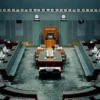Gambling adverts have generated heat in Australia lately, with critics claiming they propagate underage and problem gambling in the region. Conversely, free-to-air TVs have said banning these ads may lead to reduced funding for grassroots sports and limited free sports coverage.
Australia’s Parliamentary Inquiry Sets a 3-Year Timeframe for Ban on Gambling Ads
Last update: May, 2024

This week, the long-awaited parliamentary inquiry on these ads released its findings, and the recommendations may not sit well in some quarters. The panel has proposed a blanket 24/7 ban on gambling ads across all public media within three years. The inquiry report says this will help to prevent the manipulation of the country’s “impressionable and vulnerable audience.”
The report comes after months of discussion and blame games between the government and the opposition. Opposition leader Peter Dutton called for a ban on betting adverts during sporting events, while the country’s prime minister, Anthony Albanese, referred to them as “annoying.” However, the government side had previously accused the opposition of doing little to help when they were in power.
Thankfully, the report has provided a clear blueprint to eradicate gambling ads completely. Out of the 31 proposals mentioned in the report, the call for a blanket ban on gambling ads within three years will be the focal point.
The recommendations say that the government should implement the ban in four phases. They are as follows:
- Banning inducements, social media, and advertisements during school drop-off and pick-up times.
- The banning of online gambling adverts and commentary on odds during or an hour before/after a sports broadcast.
- Banning broadcast advertisements between 06:00 and 22:00
- Ban all forms of gambling ads by the end of three years.
Although Michelle Rowland, the minister of communications in Australia, has previously acknowledged the existence of an unfavourable status quo regarding gambling advertising, it’s unknown whether the government would fully implement the suggestions. Commercial broadcasters are anticipated to lobby strongly after warning the committee that a ban may result in limited free sports broadcasts.
Commenting on the report, Labor MP, Peta Murphy, remarked: “Gambling advertising and simulated gambling through video games is grooming children and young people to gamble and encourages riskier behaviour. The torrent of advertising is inescapable. It is manipulating an impressionable and vulnerable audience to gamble online.”
The committee’s chair added: “We have recommended the classification scheme be consistently applied across online app stores, that a simulated gambling warning label be developed, that minimum consumer protections be applied to games and better education for young people, parents, caregivers and teachers about simulated gambling.”
The inquiry has also advised the government to implement a coordinated national strategy to reduce online gambling harm. It proposes introducing a comprehensive federal regulation, a gambling ombudsman, and a special tax on companies that provide online gambling services. The report also recommends a nationwide public awareness campaign and improved data collection.
As expected, the parliamentary investigation also suggested a proper crackdown on unlawful online gambling sites. Those legal in the country should ensure they authenticate their customers’ identities before receiving bets.
The parliamentary committee was formed in September last year after Amanda Rishworth, the minister of social services, made a recommendation. According to Rishworth, the inquiry will provide the government with a solid evidence base for future action.






















